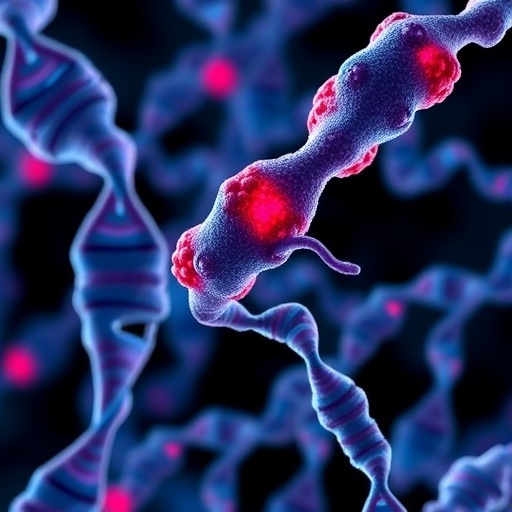Cancer is a relentless adversary, particularly when it spreads from its point of origin to distant locations within the body, a process known as metastasis. During this migration, cancer undergoes profound genetic alterations that increase its complexity and resilience, complicating efforts to treat it effectively. A groundbreaking study from Weill Cornell Medicine and Memorial Sloan Kettering Cancer Center (MSK) has shed new light on the genomic evolution that cancer undergoes during metastasis, revealing crucial insights that may transform therapeutic strategies in the future.
The research team, spearheaded by cancer genetics experts including Dr. Luc Morris, Dr. Xi Kathy Zhou, and Dr. Chaitanya Bandlamudi, analyzed genomic data from over 3,700 patients representing 24 different cancer types. Each patient had multiple tumor samples taken over time, enabling a unique longitudinal comparison between primary tumors and their metastatic counterparts. This innovative approach allowed the investigators to dissect the genetic shifts that underlie cancer’s transition from a localized disease to a systemic threat.
Utilizing MSK’s proprietary tumor sequencing technology, the researchers embarked on a comprehensive exploration of the cancer genomes. What emerged was a clear pattern: metastatic tumors frequently exhibited a significantly higher burden of copy-number alterations (CNAs) compared to point mutations. CNAs involve large-scale duplications or deletions of genomic material, contrasting with mutations, which tend to be single nucleotide changes or small insertions/deletions. This difference suggested that the genomic instability inherent in metastasis might be driven more by chromosomal rearrangements than by incremental mutational events.
One particularly striking discovery was the prevalence of whole-genome doubling (WGD) in metastatic cancer cells. WGD refers to the duplication of an entire set of chromosomes, effectively doubling the genome content of the cell. This event was observed in nearly one-third of metastatic cancer cases examined—a frequency that underscores its biological significance. According to Dr. Karena Zhao, the study’s first author, such genome doubling provides cancer cells with a genetic "hedge," enabling them to tolerate deleterious mutations or deletions in one copy of a gene by preserving functional copies elsewhere.
This genomic redundancy formed through WGD may confer a survival advantage by buffering essential genes against harmful mutations, thereby enhancing the cancer’s adaptability. Cells with doubled genomes can thus explore a wider landscape of genetic variation without succumbing to lethal damage. This flexibility is especially important in metastatic contexts, where cancer cells encounter new microenvironments and therapeutic pressures that challenge their survival.
An additional layer of complexity arises when considering the relationship between mutations and the immune system. Increasing mutational load tends to increase neoantigen presentation, essentially flagging cancer cells for immune detection and destruction. However, the study found that CNAs, not mutations, predominantly characterize metastatic tumors. These structural alterations help tumors evade immune surveillance by avoiding the generation of potentially immunogenic mutations, thereby contributing to resistance against immunotherapy treatments.
Dr. Bandlamudi emphasized that the metastatic evolutionary trajectory appears to favor genetic changes that maximize genomic instability, such as CNAs, while minimizing point mutations that could invoke an immune response. This subtle balance may be a key mechanism by which metastatic cancer evades immune eradication while continuing to evolve aggressive, treatment-resistant phenotypes.
The implications of these findings extend beyond basic science, touching directly on clinical practice. Current cancer therapies, especially immunotherapies, often rely on biomarkers such as tumor mutation burden to predict treatment responsiveness. The distinct genomic signature of metastatic tumors—marked by extensive CNAs and frequent WGD—calls for refined biomarkers that can capture this complexity. In particular, targeting the vulnerabilities created by genome doubling and CNAs presents an exciting avenue for therapeutic intervention.
This study suggests that strategies aimed at disrupting the genomic instability of metastatic tumors, or modulating the tumor microenvironment to counteract the protective effects of CNAs, could yield more durable responses in patients facing advanced cancer. The ability to precisely characterize the genomic landscape of metastases informs personalized treatment plans and may lead to the development of novel agents tailored to exploit metastatic tumor biology.
The research marks a significant step forward in unraveling the evolutionary dynamics of cancer progression. By illustrating how metastatic tumors leverage whole-genome doubling and copy-number alterations to their advantage, the study provides a conceptual framework for understanding cancer resistance and adaptation. It also challenges the prevailing focus on point mutations alone, urging a broader perspective on the genetic mechanisms driving metastatic disease.
In essence, this work underscores that cancer’s journey from a localized tumor to widespread metastasis is not merely a process of accumulating random mutations but a highly orchestrated evolutionary process dominated by chromosomal-scale changes. These changes profoundly impact tumor behavior, immune interaction, and, ultimately, patient outcomes, heralding a new era in oncology research and treatment innovation.
As cancer genomics continues to evolve, integration of sequencing technologies into clinical workflows will be essential for capturing these complex genomic events. Collaborations between researchers and clinicians, such as those exemplified by this study’s investigators at Weill Cornell Medicine and MSK, will pave the way toward translating genomic insights into actionable clinical strategies that can improve survival and quality of life for patients worldwide.
Understanding this critical genomic landscape transformation not only advances our knowledge of cancer biology but also empowers precision medicine approaches that adapt to the shifting genetic architecture of metastatic tumors. Ongoing research inspired by these findings will undoubtedly fuel the development of next-generation therapies that can outsmart cancer’s genomic plasticity and provide hope for improved management of metastatic disease.
Subject of Research: Cancer genomics and metastatic tumor evolution
Article Title: Genomic Evolution in Metastatic Cancer: The Role of Copy-Number Alterations and Whole-Genome Doubling
News Publication Date: 2-Jun-2025
Web References:
- Dr. Luc Morris – MSK
- Dr. Xi Kathy Zhou – Weill Cornell Medicine
- Dr. Chaitanya Bandlamudi – MSK
References: Published in Nature Genetics, June 2, 2025
Keywords: Genomics, Cancer genome sequencing, Copy-number alterations, Whole-genome doubling, Metastasis, Cancer evolution, Tumor mutational burden, Immunotherapy resistance




